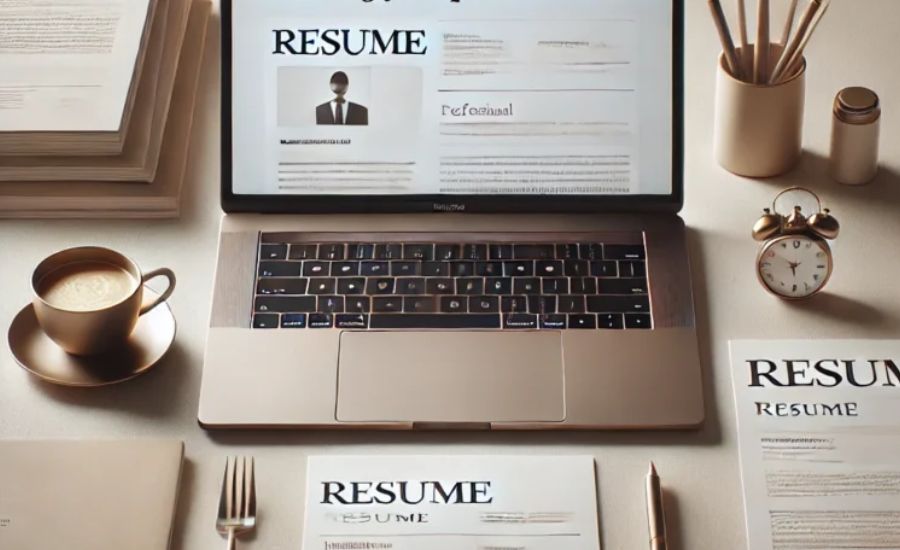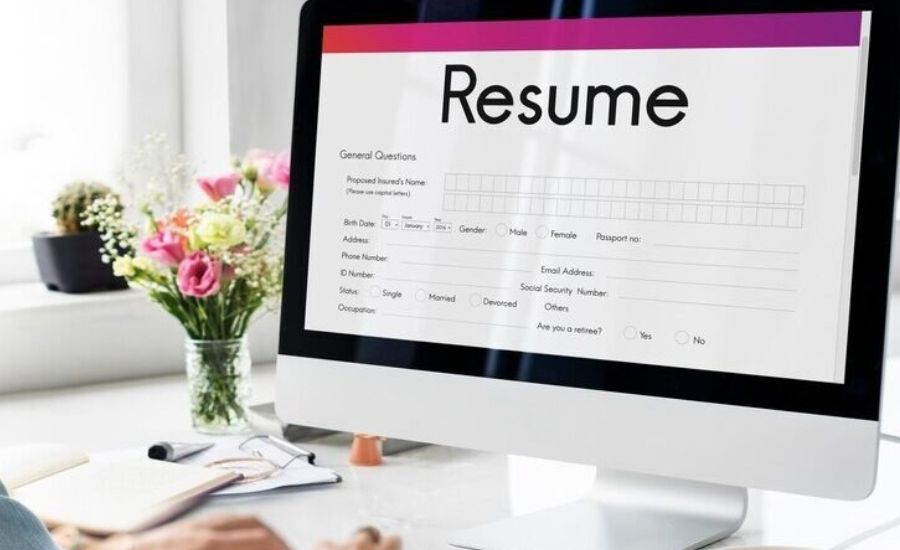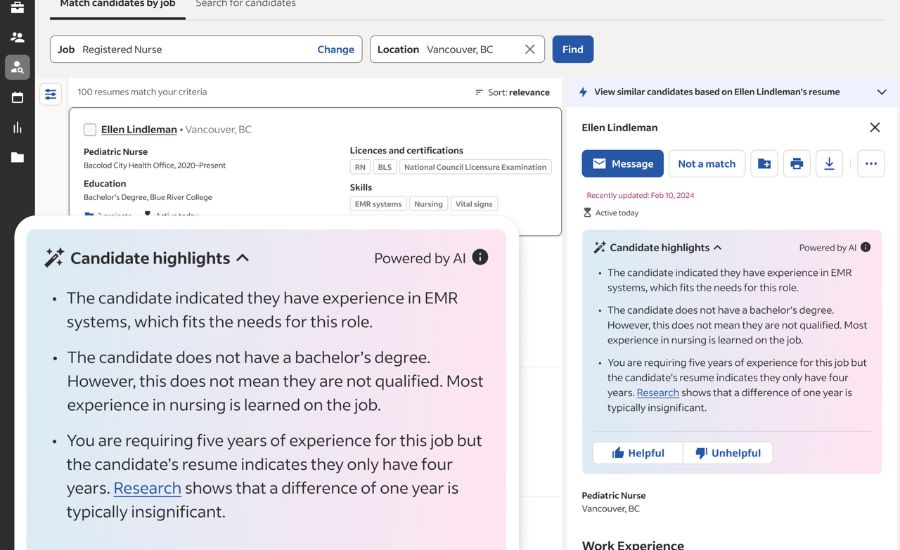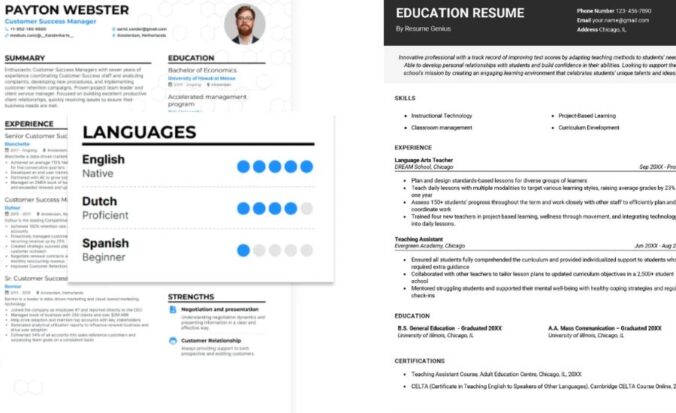Introduction to Enelimary Acevedo Indeed Resume
A well-crafted resume is often the first step in securing new career opportunities, and for professionals like Enelimary Acevedo, it serves as more than just a list of qualifications. It is a representation of her unique professional journey, skills, and dedication to her field. Crafting a resume that effectively showcases one’s abilities and experiences is crucial for standing out in today’s competitive job market.
Whether you’re crafting a resume for Enelimary Acevedo or looking for ways to improve your own resume, it’s important to understand the fundamental elements that make a resume effective. A good resume tells a compelling story about the individual’s professional background while positioning them as an ideal candidate for their target role.
In this article, we will explore the essential components of a standout resume, provide tailored advice for Enelimary Acevedo to enhance her professional image, and offer tips on how to create a resume that not only highlights her qualifications but also differentiates her in a competitive job landscape.
The Importance of a Customized Resume for Job Success

A generic CV isn’t going to cut it in today’s competitive employment market. Employers are bombarded with applications daily, and many organizations rely on Applicant Tracking Systems (ATS) to screen resumes before they even reach a human recruiter.This implies that the substance of a resume is equally as crucial as its presentation and degree of fit with the job description.A generic resume that doesn’t highlight the specific skills and qualifications relevant to the role is far more likely to be overlooked, while a customized resume can make all the difference in standing out to employers.
A customized resume goes beyond simply adding the job title to your professional summary; it’s about tailoring every section of your resume to emphasize your experience, skills, and qualifications that directly correspond with the job requirements. This personalized approach shows the employer that you’ve carefully considered how your background fits with the position and that you’re genuinely interested in the opportunity.
For instance, if you’re applying for a digital marketing role, your resume should highlight key skills such as SEO, content strategy, social media management, and data analysis. By emphasizing your expertise in these areas, you demonstrate that you understand the specific demands of the role and have the qualifications to excel in it. Customizing your resume in this way can make it much more compelling and increase your chances of being noticed by hiring managers.
Key Components of a Strong Resume
Making a good impression in a competitive job market requires a well-written résumé.Each section of your resume plays a crucial role in presenting your qualifications and expertise to potential employers. Below are the key elements to focus on when building a strong, effective resume:
1. Contact Information
Your contact details are fundamental to your resume. This section should be clear, concise, and up-to-date to make it easy for hiring managers to reach you. Ensure that the following are included:
- Full Name: Make use of your professional name.
- Phone Number: Provide a number where you can easily be reached.
- Professional Email Address: Make use of a professional email address.Avoid using casual or outdated addresses like “[email protected].” Instead, opt for something simple and professional, such as “[yourname]@gmail.com.”
- LinkedIn Profile: Including a link to your LinkedIn profile (if applicable) can provide employers with additional insights into your professional background. You can also consider adding links to a personal website, portfolio, or other professional social media profiles if they’re relevant to your field.
2. Professional Summary
The professional summary functions as the elevator pitch for your resume. This section should be a succinct summary of your main skills and what you can offer the organization, no more than two to four sentences.It is essential to emphasize the value you bring to the table rather than just listing your skills.
For example, for a customer service role, you might write: “Customer service professional with 5+ years of experience in delivering excellent customer support, resolving complex issues, and improving satisfaction rates. Adept at utilizing conflict resolution strategies to build long-term relationships with clients.”
Keep this section impactful and direct to capture the employer’s attention right away.
3. Work Experience
The foundation of your CV is the work experience section. It highlights your prior positions, duties, and accomplishments.Listing your work history in reverse chronological order (starting with your most recent job) ensures that employers see your most relevant experience first.
For each position, include:
- Job Title: The role you held.
- Company Name & Location: The organization where you worked, along with its city and state.
- Employment Dates: Clearly state the duration of your employment (month and year).
- Key Responsibilities & Achievements: Focus on the tasks you were responsible for, and—most importantly—highlight your accomplishments. Use quantifiable metrics when possible to show the impact you had on the organization. For example:
- “Managed customer service calls, resolving 95% of issues on the first call and increasing satisfaction scores by 20%.”
- “Led a project team to implement a new software system that reduced processing time by 30%.”
This section should demonstrate not only what you did but also how your contributions positively impacted the company.
4. Education
If you’re in the early stages of your career, your educational background will likely be one of the first things hiring managers look at.Enumerate your greatest educational attainment, encompassing:
- Degree Obtained: E.g., Bachelor’s, Master’s, etc.
- Institution Name: The name of the university or institution you were a student at.
- Dates of Attendance: The years or range during which you were enrolled.
If relevant, include any academic honors, scholarships, or awards you received during your studies. Additionally, if you have pursued any certifications or specialized training, make sure to highlight them, especially if they’re related to the job you’re applying for. For example:
- “Certified Data Analyst – XYZ Institute”
- “Project Management Professional (PMP) Certification”
5. Skills
The skills section is vital for showcasing your qualifications in relation to the position you’re applying for. Break your skills down into two categories: technical and soft skills.
- Technical Skills: These are job-specific abilities, such as proficiency with software, programming languages, or tools. For instance, you might list:
- “Proficient in Microsoft Excel (Advanced level)”
- “Skilled in Adobe Creative Suite (Photoshop, Illustrator, InDesign)”
- Soft Skills: These are personal traits and interpersonal abilities that are essential in any role. Examples include:
- “Effective communication skills”
- “Problem-solving ability”
- “Strong teamwork and collaboration skills”
Tip: To make sure your resume passes through Applicant Tracking Systems (ATS), which are commonly used by employers to filter resumes, tailor your skills section to match keywords from the job description. For instance, if the job requires expertise in a specific software, such as Excel or Salesforce, be sure to list that in your skills section if you have the proficiency.
6. Additional Sections (Optional)
While not always necessary, additional sections on your resume can help you stand out by showcasing your unique qualifications. These may include:
- Volunteer Experience: If applicable, volunteer work can demonstrate your commitment to causes and your ability to work in different settings.
- Certifications & Licenses: Include any relevant certifications or professional licenses that apply to the job.
- Languages: If you speak multiple languages, list them with your level of proficiency (e.g., fluent, intermediate, conversational).
- Awards & Honors: Showcase any recognition you’ve received for outstanding performance or contributions to a previous employer or industry.
By including these sections strategically, you enhance your chances of showcasing the full scope of your qualifications.
Crafting a Personalized Resume for Enelimary Acevedo
Creating a standout resume for Enelimary Acevedo involves more than just listing her skills and experience—it’s about showcasing her unique qualifications in a way that appeals directly to potential employers. By tailoring the resume to Enelimary’s field and career goals, it can reflect her expertise in both soft and technical skills. The result should be a document that highlights her professional achievements, showcases her ability to contribute to an organization, and aligns with industry expectations.
Tailoring the Resume to Enelimary’s Career Field

To make the resume as effective as possible, it’s important to tailor it to the specific job or industry Enelimary is applying to. This means carefully selecting the skills and experiences that align with the job description and requirements. For example, if she’s applying for a project management role, her resume should emphasize skills such as leadership, time management, and strategic planning. Conversely, for a data analyst position, showcasing expertise in data interpretation, software tools, and problem-solving would be more appropriate.
The language used should be concise, direct, and action-oriented. A strong resume doesn’t just describe what Enelimary can do; it demonstrates how she has already made an impact in her previous roles. This focus on accomplishments rather than just duties will help her stand out.
Highlighting Soft and Technical Skills
A successful resume for Enelimary Acevedo should balance both soft and technical skills, depending on the role she’s seeking. Soft skills such as communication, teamwork, and leadership are valuable in almost every field, so they should be woven throughout her resume. Specific examples of how she has used these skills to improve outcomes in past roles will make her resume more compelling.
On the other hand, technical skills (like proficiency in project management software, data analysis tools, or marketing automation platforms) should also be highlighted. These skills are essential for showcasing her practical expertise and making her resume attractive to employers who rely on specific tools or methodologies.
Structuring Enelimary’s Story
Each job on Enelimary’s resume should tell a compelling story of her contributions to the organization. Rather than simply listing her responsibilities, the focus should shift to her achievements and the results of her work. This approach not only demonstrates her impact but also shows that she understands the importance of driving measurable results.
To make her achievements stand out, it’s important to use numbers and statistics wherever possible. For instance, rather than saying, “Managed a team,” Enelimary could write, “Led a team of 10 members, increasing team productivity by 30% over six months.” These kinds of specifics help potential employers see the tangible value Enelimary brings to the table.
Focusing on Achievements and Impact
To truly make her resume shine, Enelimary should prioritize accomplishments that reflect her ability to solve problems, innovate, or bring value to an organization. For example, if she helped streamline a process or contributed to a successful project, these experiences should be front and center. Quantifying these achievements—whether through increased sales, cost savings, customer satisfaction improvements, or efficiency gains—provides concrete evidence of her success.
Incorporating this achievement-driven approach throughout her resume not only emphasizes her skills but also gives employers a clear picture of how she can contribute to their success. The ultimate goal is to showcase Enelimary as a results-oriented professional who delivers measurable outcomes.
Common Mistakes to Avoid When Creating a Professional Resume
Creating a standout resume is crucial for landing your desired job. However, many candidates make simple but significant mistakes that can hinder their chances. By avoiding common blunders, you can ensure your resume presents you in the best possible light. Below are the top mistakes to watch out for when crafting your resume:
1. Typos and Grammatical Errors
One of the quickest ways to derail your chances of getting noticed is by submitting a resume with typos or grammatical mistakes. These errors not only make your document look unprofessional but also suggest a lack of attention to detail. To find any mistakes, proofread your resume several times.Utilizing tools like Grammarly or asking someone else to review your resume can also help ensure that it is free from mistakes. Remember, a polished resume reflects your professionalism and diligence.
2. Including Irrelevant Information
Resumes should focus on what matters most to the hiring employer—your relevant skills, experiences, and qualifications. Including unrelated personal details like hobbies, personal interests, or unrelated work experience can clutter your resume and distract from your key qualifications. Only include information that directly aligns with the job you’re applying for. For example, if you’re applying for a marketing role, emphasize your communication, branding, and digital marketing experience, and omit unrelated experiences.
3. Using a One-Size-Fits-All Resume
Sending out the same generic resume to every employer is a common mistake. While it may seem like an efficient approach, it greatly reduces your chances of standing out. Every job is different, and your resume should reflect that.Tailoring your resume for each specific job application helps highlight the skills and experience that are most relevant to the role. Take the time to adjust your professional summary, skills, and work experience to align with the job description and demonstrate that you’ve done your research on the position.
4. Overloading with Jargon
It’s important to showcase your expertise and industry knowledge, but overloading your resume with technical jargon, acronyms, or industry-specific language can make your resume harder to understand—especially for non-specialized hiring managers or recruiters. While it’s okay to include certain industry terms, make sure your resume remains accessible to a wider audience. Use clear, simple language that conveys your skills and experience without the need for extensive technical terms. This ensures that your resume can be understood by anyone reviewing it, not just those in your specific field.
5. Failing to Highlight Achievements
Rather than just listing your job responsibilities, focus on showcasing your achievements and measurable results. Employers are interested in what you have accomplished in your previous roles and how your contributions impacted the company. Use quantifiable results wherever possible. For example, instead of writing, “Managed a team,” consider saying, “Led a team of 10 to complete projects ahead of schedule, increasing efficiency by 15%.” This approach demonstrates your effectiveness and gives the employer concrete evidence of your abilities.
The Importance of Personalization in Resume Writing
Your resume is more than just a document; it serves as your personal marketing tool. Just like any form of marketing, it must be tailored to suit the specific audience—in this case, the hiring manager. Personalization is a key element in creating a resume that not only stands out but also speaks directly to the employer’s needs. By customizing your resume for each position you apply for, you demonstrate a deeper understanding of the role and a clear alignment with the company’s objectives.
Personalizing your resume goes beyond making simple edits to the skills section. It requires aligning your experiences, qualifications, and achievements with the specific requirements of the job you’re targeting. For example, if you’re applying for a customer service position, focus on your ability to handle challenging customer interactions, your conflict-resolution skills, and your proven track record in maintaining high levels of customer satisfaction. This approach ensures that hiring managers see how you can contribute to their business from the moment they glance at your resume.
When your resume reflects the skills and experiences that the employer values most, you’ll position yourself as a standout candidate. Personalization not only helps you match the job description but also showcases your genuine interest in the role and your ability to adapt your expertise to different business needs.
The Role of Feedback in Resume Enhancement

A resume is not a static document; it should evolve as your career progresses. Continually refining your resume is essential to ensure it remains relevant, clear, and impactful. Feedback plays a critical role in this process. By seeking input from trusted mentors, colleagues, or career coaches, you gain a fresh perspective that can identify areas for improvement or highlight aspects that you may have overlooked.
Receiving feedback helps ensure that your resume reflects the best version of your professional self. A mentor, for instance, might point out a skill you haven’t emphasized or suggest a clearer way to present your achievements. Furthermore, they may identify industry-specific trends or language that will help your resume pass through Applicant Tracking Systems (ATS), which are used by many companies to filter applications.
A helpful strategy is to revise your resume after each job application. This ensures that you remain proactive in adapting to shifting expectations in the job market and stay current with best practices in resume writing. Each time you revise your resume, you not only improve it for the next opportunity but also ensure that your document becomes an ongoing reflection of your professional growth. By embracing this iterative approach, you’ll increase your chances of securing interviews and ultimately landing the job you desire.
Final Tips for a Successful Resume
- Keep It Concise: Your resume should ideally be no more than one to two pages long. Focus on the most relevant information and avoid unnecessary details.
- Format for Readability: Use clear headings, bullet points, and appropriate white space to make your resume easy to read. Ensure your font is professional and legible (e.g., Arial or Calibri, 10-12 pt).
- Proofread: A resume with spelling or grammar errors can leave a negative impression. Carefully proofread your resume or ask someone else to review it before submitting.
- Tailor for Each Job: Customize your resume for each position you apply for by highlighting the skills and experiences most relevant to the job description.
Crafting a resume that highlights your strengths and accomplishments, while being tailored to the specific job you’re applying for, is key to making a lasting impression on employers. With a strong, well-organized resume, you’ll increase your chances of landing the job you desire.
Summary
In the competitive job market of today, a customized resume is essential. It’s not just a list of skills and experiences; it’s a marketing tool that must be tailored to the specific needs of the job you’re applying for. Personalization goes beyond altering a few sections; it involves aligning your experiences and achievements with the employer’s expectations. This helps showcase your suitability for the role, making you stand out to hiring managers.
Feedback is another essential component of creating a standout resume. By seeking input from mentors, colleagues, or career coaches, you can improve your resume, highlight your strengths more effectively, and adapt to evolving trends. Continuously refining your resume ensures it remains relevant and impactful, helping you progress in your career.
Frequently Asked Questions (FAQs)
1. How important is personalization when writing a resume?
Personalization is crucial. A personalized resume allows you to align your qualifications, experience, and skills with the job you’re applying for. It shows that you’ve done your research and are genuinely interested in the role, which increases your chances of getting noticed by hiring managers.
2. How do I personalize my resume for each job?
To personalize your resume, carefully review the job description and highlight relevant skills and experiences that match the employer’s needs. For example, if the job requires project management skills, emphasize your experience in managing projects, meeting deadlines, and leading teams.
3. Can feedback help improve my resume?
Yes, feedback is an essential part of resume improvement. Mentors or career coaches can provide valuable insights into how to better present your skills and experience. They can also point out areas you may have missed or help refine your document to meet current trends in resume writing.
4. How often should I update my resume?
It’s a good idea to revise your resume after each job application. By doing this, you can tailor it to specific roles and keep it up to date with any new skills, certifications, or experiences you’ve gained.
5. What role does a professional summary play in a resume?
A professional summary is your resume’s introduction, providing a concise overview of your skills, achievements, and career objectives. This section should grab the hiring manager’s attention and give them a quick sense of your expertise and the value you bring to the role.
Key Facts
- Personalization increases your chances of getting noticed: Tailoring your resume to a specific job is an effective way to stand out from the pool of candidates.
- Feedback leads to improvement: Getting external input, especially from mentors or career coaches, can help refine your resume and highlight your strengths.
- A well-structured resume is easier to read: Use clear headings, bullet points, and a professional format to make your resume user-friendly and easy to skim.
- Keep your resume concise: Avoid overloading your resume with irrelevant information. Emphasize experiences and abilities that are directly relevant to the position.
- Revise your resume regularly: Continuously update your resume to reflect new accomplishments, certifications, or job changes, and ensure it stays relevant to the job market.
Read more Information about information at Visit SearchKnowledge

Leave a Reply